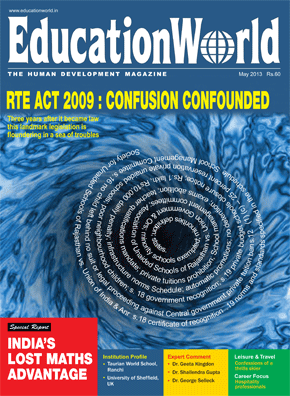 Thanks for your insightful cover story ‘RTE Act, 2009: Confusion confounded’ (EW May). Three years on, there’s no doubt the well-intentioned RTE Act will do more harm than good to Indian education.
Thanks for your insightful cover story ‘RTE Act, 2009: Confusion confounded’ (EW May). Three years on, there’s no doubt the well-intentioned RTE Act will do more harm than good to Indian education.
It’s quite obvious the main targets of the RTE Act are the country’s private budget schools which have sprung up as alternatives to underperforming government schools. Budget schools are doing a good job of providing education at ridiculously low prices to children of the poor who otherwise would be condemned to dysfunctional government schools. If your estimate of 400,000 unrecognised private budget schools is correct, there will be a mass parents’ revolt if these schools are forced to shut down because they haven’t upgraded their teacher-pupil ratios, buildings, toilets, drinking water facilities, etc as per the RTE Act. Instead of shutting them down, the government should provide interest-free loans to the managements of these schools to upgrade their facilities.
Also why are only private schools threatened with closure and derecog-nition for failing to meet the infrastructure norms of the RTE Act while government schools are exempt? This is criminal discrimination as most government schools are pathetically under-resourced in terms of infra-structure and teachers. The RTE Act must be applied with full rigour to them as well.
Arjun Dasgupta
Delhi
National teacher training programme call
Thanks for the thought-provoking special report ‘India’s lost maths advantage’ (EW May). It’s tragic how India has frittered away its thousand-year maths heritage and is rapidly losing its mathematical prowess. The root of the problem as Hemalatha Raghupathi has correctly analysed, is in the way we teach maths through rote learning and memorisation in schools. Maths subjects being applications-oriented are deeply related to real life. But teachers continue to force children to mug formulae and theories. This has killed the joy of understanding and experiencing maths. Hence the widespread math phobia in students.
Though it was encouraging to read that in some private schools, efforts are being made to teach maths practically through math labs, the problem is with the 1 million plus government schools. Is anyone attempting to change the way maths is being taught in them? To effect change, the government must initiate a national math teacher training programme to help teachers learn and implement new pedagogies.
Moreover, schools and colleges should make special efforts to educate students about the life and achievements of mathematical genius S. Ramanujan as an inspiration and role model.
Suresh Swaminathan
Chennai
Defective electoral laws
I fully endorse the views of your editorial ‘People need to seek political alternatives’ (EW May). It is a fact that we get the government we deserve. But it’s important to appreciate why people vote for corrupt candidates. It’s because of defective electoral laws which need to be changed. A person with a criminal background is not eligible for a government job but can stand for elections and become a policy maker. This is a mockery of democracy.
Media reports indicate that the number of citizens casting their votes has increased over the years. This is a good sign. But it’s equally important that the voters elect the right candidates — people without criminal backgrounds and whose personal wealth has not multiplied manifold during their political careers.
Unfortunately, no political party is interested in fielding honest candidates as politics is the best way to amass wealth at the cost of tax payers. The dominant mantra in Indian politics seems to be fill personal tizoris and empty the country’s treasury! That’s why it’s important for the public to seek out and encourage honest and competent people to enter politics.
Mahesh Kapasi
Delhi
Most dangerous nation
Your cover story (‘Huge damage of gender crimes tidal wave’, EW April) was very upsetting. Of course I have been reading about crimes against women and girls in India, but I really did not know of the huge constraints this poses for university students and how they have to leave campuses early every day. It’s truly shocking and out of control. Are there other major countries in the world that are as dangerous for women? I doubt if China is, but I don’t really know. Brazil? I have a feeling India is the most dangerous. The question is why.
Dr. Ellen Winner
Boston College, USA
Top priority issue
Congratulations for publishing a great magazine. It’s unique and informative. Your cover story ‘Fear over India... Huge damage of gender crimes tidal wave’ (EW April) addresses a very important issue plaguing modern India. The issue of women’s safety and well-being should be the top priority of citizens and government.
It was disheartening to read your statistics highlighting the large number of women being forced out of academia, the corporate sector and industry resulting in huge economic loss to the nation. It was an eye opener to read about China turning into a genuine global power because their “women hold up half the sky’’. China’s per capita income was three times of India last year. This should serve as a wake-up call to our leaders and the public.
The plain reality is that a nation can only progress if its women can contribute equally to the uplift of society. But if they live in constant fear of degradation, how can they contribute to national development? Therefore the vital importance of India empowering women with high-quality education and freedom. Only if half the population can live and work without fear can the nation realise its full growth potential.
Dr. Ashita Sharma
Chandigarh